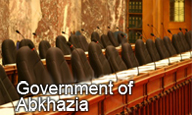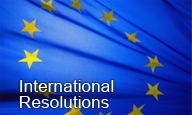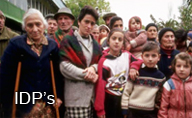The necessity of establishing a new world order, a new architecture of global security, new military-political and economic ties, reorganization of existing associations and international organizations is inevitable. Moscow once again has made it clear that it disregards the international law and this time focuses on the "justice" of brute force; That Russia remains a brutal invader; That Russia is an unreliable partner; That Russia is not at all interested in the people, including the ethnic Russians themselves; The fate of the so-called Russian-speaking population, their rights, freedom and even life; His one and only purpose is to conquer the territories of his neighbors. He was the same in the XIX century - during the Muhajir period and remains the same today. The Kremlin's main strategic goal at this stage is the annexation of territories belonging to neighboring Sovereign States created by the collapse of the Soviet Union, as well as to the occupied territories Russia has temporarily granted the formal status of "independent" states.
Russia is the only one country in the world that has, in advance, created the necessary "legal" basis for the implementation of its own annexation plans. Moscow even back in 2001 approved a constitutional law on the annexation of other territories and the establishment of new entities within the Russian Federation; The Russian law on citizenship includes the concept of "changed state ownership" territories and defines the rules for granting citizenship to the population of such territories. In parallel and alongside with the creation of a "legal" base, the Kremlin has been preparing for an aggressive war for years, both militarily and ideologically. The results of the preparations were demonstrated by the ongoing large-scale hostilities against Ukraine. The entire world witnessed the criminal face of the Russian top political leadership, the savagery and inhuman cruelty of the Russian armed forces, technical backwardness and inability to fight. It emerged that, V. Putin’s regime being bogged down in corruption, failed to form for 20 years a combat-ready armed force equipped with modern military technique. The commander-in-chief and generals of these forces, in terms of martial arts, are stuck in the first half of the twentieth century.
The sanctions imposed on Russia by the Collective West, which will be further tightened in the future, as well as the lack of prospects for a favorable return to the situation in the future, the mass exodus of the working population from the country, complete international isolation put the Russian Federation in a difficult position.
The situation becomes even more aggravated by the launch of an investigation into a war crime and a lawsuit filed by a large group of States, including Georgia, against the Kremlin, which is suspected of the genocide of the Ukrainian people. Russia's criminal war against Ukraine has put its "allies" and "strategic partners" at a disadvantage. Abkhazia is among them. Unfortunately, a small group of volunteers from Abkhazia is taking part in hostilities on the side of the bloodthirsty aggressor. That symbolic support from the Abkhazian side does not satisfy the Kremlin and it in addition demands from Sokhumi to send the armed formations being at its disposal to the Ukrainian “mincing machine” or the same “butchery.” The Abkhazian society, as well as the de facto Government, have so far limited themselves to verbal support for the Kremlin, which cannot help the dissatisfaction of the "strategic partner. Sokhumi's sharply negative attitude towards the Kremlin plan to integrate Abkhazia into Russia has sharply irritated the Moscow political establishment and related experts. The case even went so far as to intimidate Abkhazians from Moscow with a "Georgian threat."
Relations with the occupying State are further strained by the fact that the Abkhazian side is constantly delaying the implementation of a 45-point document signed in Sochi on November 12, 2020, a program of creeping annexation of Abkhazia by Russia. Sokhumi has not fulfilled any of its obligations under the program.
Particularly acute and critical are the issues related to Russia's far-reaching goals, such as the introduction of dual citizenship, Russia's right to purchase real estate, including the homes of IDP Georgians, the seizure of the energy sector, electricity infrastructure, etc. Russia has not yet resorted to the use of force to implement its annexation plans, although the Kremlin's dissatisfied position on certain issues in principle is clearly changing - it is shifting in the direction of tightening and intensifying pressure.
The tightening and stiffening of policy is clearly reflected in the Kremlin's de facto "ambassador" and "outside ruler" in Sokhumi, or the so-called practical work of the Minister of Foreign Affairs. Russia is already using and will intensify in the future the leverage of pressure on Sokhumi, such as a sharp reduction of economic aid, artificially aggravating the already difficult social situation. Moreover, Moscow has extensive experience in managing chaos in Abkhazia, provoking political crises and, if necessary, replacing de facto rulers. It is known for a fact, that the demands made by the Kremlin for Sokhumi are unacceptable to a large part of the Abkhazian society. Moreover, it is frustrated by the current policy of the "strategic partner", the attack on Ukraine, the subsequent long-term international isolation, the dire economic situation created in Russia because of sanctions. This frustration will only deepen in the future.
It is obvious, that even after the end of the war against Ukraine, whatever the result, a weakened Russia will be no less dangerous than it is today. It will need to create the illusion of its own "power" and "victory" in Russian society, for which it will inevitably renew the above-mentioned annexationist demands and fully activate the economic or military levers being at its disposal. Highly as it was in 1992, he will continue to try to provoke a war between Georgians and Abkhazians, or to introduce war rhetoric in an already tense bilateral relationships and further aggravate the situation.
The Supreme Council considers itself obliged to state unequivocally that the Russian scenario of August 1992 will not be repeated under any circumstances. The Government of Georgia remains fully committed to the non-use of force in Abkhazia and the Tskhinvali region and the restoration of the country's territorial integrity by peaceful means only. It is also obliged, by the unilateral commitment to the European Parliament made on November 23, of 2010 and being confirmed by the special statement of the Parliament of Georgia of March 7, 2013.
We strongly believe that the Georgian side will help Abkhazians without any preconditions to overcome the expected social and economic problems, to restore trade and economic ties, to develop small and medium-sized businesses on both sides of the Enguri River, as well as to develop family and farm economy.
We call on and appeal to the Abkhazian side to facilitate the establishment of business relations between our citizens, to take measures to facilitate the procedures related to the movement at the Rukhi-Chuburkhinji checkpoint.
Chairman of the Supreme Council of
The Autonomous Republic of Abkhazia Jemal Gamakharia






















